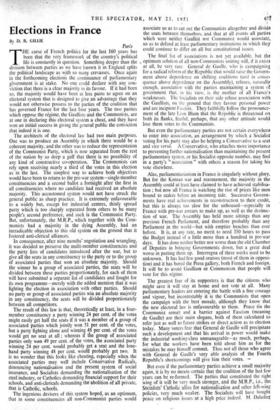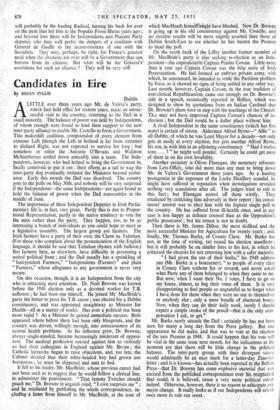Elections in France
By D. IL GILL1E Paris THE curse of French politics for the last 160 years has been that the very framework of the country's political life is constantly in question. Something deeper than the division between parties as we have known it in England splits the political landscape as with so many crevasses. Once again in the forthcoming election's the continuance of parliamentary gbvernment is at stake. No one could declare with any con- viction that there is a clear majority in its favour. If it had been so, the majority would have been at less pains to agree on an electoral system that is designed to give an advantage that they would not otherwise possess to the parties of the coalition that has governed France for the last four years. The two parties which oppose the regime, the Gaullists and the Communists, are at one in declaring this electoral system a cheat, and they have won an initial success in giving the general public the conviction that indeed it is one.
The architects of the electoral law had two main purposes.
One was to produce an Assembly M which there would be a coherent majority, and the other was to reduce the representation of the Communist Party, which is now separated from the rest of the nation by .so deep a gulf that there is no possibility of any kind of constructive co-operation. The Communists can rely upon receiving nearly a third of the votes in this election as in the last. The simplest way to achieve both objectives would have been to return to the pre-war system—single-Member constituencies and a second ballot a fortnight after the first in all constituencies where no candidate had received an absolute majority. This accustomed system would not have struck the general publie as sharp practice. It is extremely unfavourable to a widely but, except for industrial centres, thinly spread party which is too sharply separated from others to be many people's second preference, and such is the Communist Party. But, unfortunately, the M.R.P., which together with the Com- munists had a majority in the dying Assembly, had an ineradicable objection to this old system on the ground that it fostered anti-clerical alliances.
In consequence, after nine months' negotiation and wrangling, it was decided to preserve the multi-member constituencies and the party lists of candidates introduced after the war, but to give all the seats in any constituency to the party or to the group of associated parties that won an absolute majority. Should the winner be a group of associated parties, the seats will be divided between these parties proportionately, for each of them will have submitted a separate list of candidates and fought for its own programme—merely with the added mention that it was fighting the election in association with other parties. Should no party or group of associated parties win an absolute majority in any constituency, the seats will be divided proportionately between all competitors. The result of this law is that, theoretically at least, in a four- member constituency a party winning 24 per cent. of the votes might easily get half the seats if it was a member of a group of associated parties which jointly won 51 per cent. of the votes, but a party fighting alone and winning 48 per cent. of the votes would get no seat at all ; whereas if the group of associated parties only wen 49 per cent. of the votes, the associated party winning 24 per cent. would probably get a seat and the lone- hand party winning 48 per cent. would probably get two. It is no wonder that this looks like cheating, especially when the associated parties may well include Conservative Radicals, denouncing nationalisation and the present system of social insurance, and Socialists demanding the nationalisation of the steel industry, or Catholics demanding financial support for their schools, and anti-clericals demanding the abolition of all private, that is Catholic, schools.
The ingenious devisers of this system hoped, as an optimum, that in some constituencies all non-Communist parties would • .1 associate so as to cut out the Communists altogether and divide the seats between themselves, and that at all events all parties which were neither Gaullist nor Communist would associate, so as to defend at least parliamentary institutions in which they could continue to differ on all but constitutional issues.
The final list of associations is not yet available, but the , optimum solution of all non-Communists uniting will, if it exists at all, be very rare. General de Gaulle, who is campaigning for a radical reform of the Republic that would raise the Govern- ment above dependence on shifting coalitions (and in conse- quence above dependence on the Assembly), refuses, naturally enough, association with the parties maintaining a system ot government that, in his view, is the mother of all France's weaknesses. The Socialists on their side refuse association with the Gaullists, on the ground that they favour personal power and arc incipient Fascists. They faithfully follow the pronounce- ment of the late Leon Blum that the Republic is threatened on both its flanks, fearful, perhaps, that any other attitude would lose them votes to the Communists.
But even the parliamentary parties are not certain everywhere to enter into association, an arrangement by which a Socialist voting for his party may also be helping a Conservative to a seat and vice versa. A Conservative, who attaches more importance to preventing further nationalisation than maintaining the present parliamentary system, or his Socialist opposite number. may find in a party's "association" with others a reason for taking his vote elsewhere.
Alas, parliamentarianism in France is singularly without glory. But for the Korean war and rearmament, the majority in the Assembly could at least have claimed to have achieved stabilisa- tion ; but now all France is watching the rise of prices like men bound to stakes before an incoming tide. Successive Govern- ments have real achievements in reconstruction to their credit, but this is always too slow for the unhoused—especially in France with pre-war arrears to make up, as well as the destnuc- tion of war. The Assembly has held more sittings than any previous French Parliament, and therefore probably than any Parliament in the world—but with emptier benches than ever before. It is, at any rate, no merit to need 350 hours to pass the Budget instead of a little more than a hundred in pre-war days. It has done neither better nor worse than the old Chamber of Deputies in bringing Governments down, but a great deal worse in putting them up. Interregna of three weeks used to be unknown. It has had few good orators (most of them in opposi- tion) and it has bored the Press gallery, both French and foreign. It will be to avoid Gaullism or Communism that people will vote for this regime.
The greatest fear of its supporters is that the citizens who might save it will stay at home and not vote at all. Many parliamentary leaders are entering the battle with a fine courage and vigour. but incontestably it is the Communists that open the campaign with the best morale, although they know that the new electoral law is unfavourable to them. Peace (in the Communist sense) and a barrier against Fascism (meaning de Gaulle) are their main slogans, both of them calculated to refer just as well to future strikes or direct action as to election today. Many voters fear that General de Gaulle will precipitate such a development and that his arrival in power would make the industrial working-class unmanageable—as much, perhaps, for what the workers have been told about him as for the mistakes he may himself commit. Thus not all those who agree with General de Gaulle's very able analysis of the Fourth Republic's shortcomings will give him their votes. — But even if the parliamentary parties achieve a small majority again, it is by no means certain that the coalition of the last few years can be re-formed. The parties that constituted the right wing of it will be very much stronger, and the M.R.P.. i.e.. the Socialists' Catholic allies for nationalisation and other left-wing policies, very much weaker. The Socialists will have bought peace on religious issues at a high price indeed. M. Daladier will probably be the leading Radical, turning his back for ever on the path that led him to the Popular Front fifteen years ago ; and beyond him there will be Independents. and Peasant Party deputies who may well prefer the dangers of a coalition with General de Gaulle to the inconveniences of one with the Socialists. They may, perhaps, be right, for France's greatest need when the elections are over will be a Government that can borrow from its citizens. But what will be the Geheral'? conditions for such an alliance ? They will be very stiff.



































 Previous page
Previous page